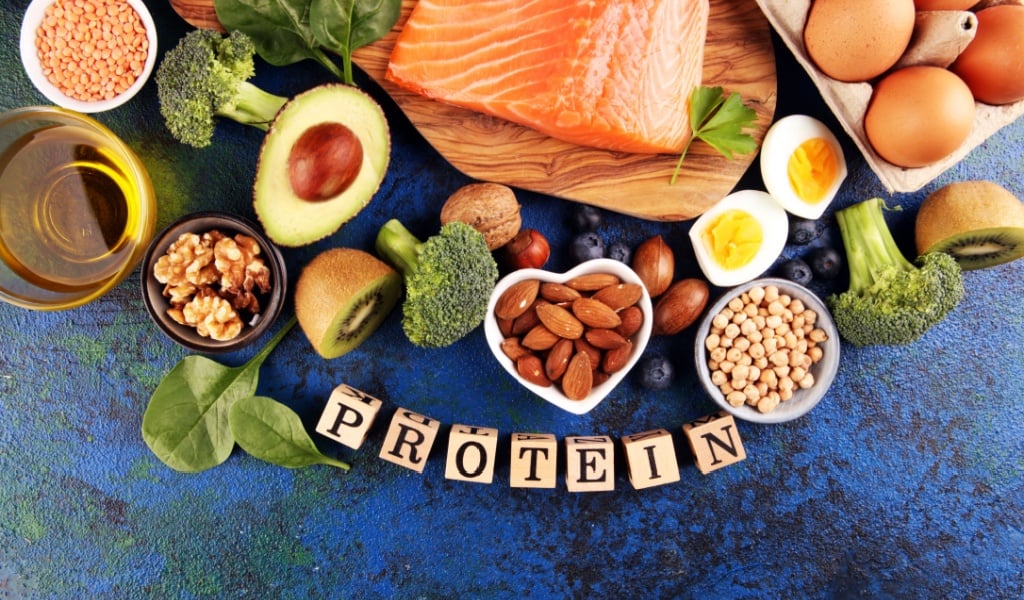Protein is a major source of nutrition, and it is not just for weightlifters. It plays a vital role in people’s overall health and well-being. Scientific research continuously highlights the multiple benefits of a protein-rich diet apart from muscle building. From improving weight management to supporting immune function and promoting healthy aging, protein is essential for many physical bodily functions. Here are 12 scientifically supported claims for increasing your protein intake:

Weight Management
Adding enough protein to your diet can help control body weight in several ways. Protein has a higher thermic effect than fats and carbohydrates, which means your body applies more energy (calories) to digest and process protein-rich foods. This can help increase feelings of fullness and reduce overall calorie intake, which are useful for weight loss and maintenance.
Studies show that protein-rich diets can help control appetite hormones, such as ghrelin and leptin, which control hunger and fullness. Protein can support constant weight control efforts by promoting feelings of fullness and reducing cravings.
Muscle Growth & Repair
Protein is important for muscle growth and repair, making it essential for athletes and individuals engaging in regular physical activity. When you eat protein-rich food, it breaks down into amino acids, which are the foundation for muscle tissue. This procedure, known as muscle protein synthesis, is important for repairing damaged muscle fibers and building new muscle tissue. Research claims that protein-rich foods or supplements post-exercise can boost recovery and maximize the benefits of physical training.
Higher Immune Function
Protein is necessary for a healthy immune system. It provides the amino acids necessary for the creation of antibodies and immune cells. These elements are important for identifying and fighting off infections caused by bacteria, viruses, or other germs.
A protein deficiency can harm immune function, making individuals more vulnerable to infections and illnesses. Ensuring a satisfactory intake of protein-rich foods may support immune system function and boost the body’s ability to defend against germs.
Bone Health Improvement
Protein is important for muscles and bone health. Bones are made of collagen, a protein-rich medium that provides bone structure and strength. Sufficient protein intake supports bone mineral content and density, reducing the risk of osteoporosis and fractures, especially in older adults.
Stable Blood Sugar Levels
Protein plays a key role in securing blood sugar levels by slowing down the absorption of carbohydrates during digestion. As a result, you can avoid rapid spikes and crashes in blood glucose levels, which is helpful for better energy levels, mood stability, and reducing the risk of type 2 diabetes.
Improved Heart Health
Research advises that protein may have advantageous effects on heart health, mainly through its influence on cholesterol levels and blood pressure. High cholesterol and hypertension are key risk factors for heart disease, which is a leading cause of death globally.
Research indicates that diets higher in protein, mainly from limited sources like poultry, fish, and lentils, may help lower LDL (bad) cholesterol levels and reduce blood pressure. These effects help to lower the risk of heart disease and sudden heart attacks.

Improved Cognitive Abilities & Emotional Well-Being
Amino acids obtained from dietary protein serve as ancestors to neurotransmitters like serotonin and dopamine, which play vital roles in regulating mood, cognition, and emotional well-being. Sufficient protein intake supports the creation of these neurotransmitters, promoting mental clarity, stability, and overall cognitive function. It can also help those struggling with stress, anxiety, or mild cognitive impairment.
Healthy Skin, Hair, & Nails
Protein is important for maintaining the health of your skin, hair, and nails. Collagen, the richest protein in the body, delivers structural support to these tissues, promoting resistance, strength, and overall appearance. Therefore, it is generally helpful for those looking to maintain youthful skin or improve the condition of their hair and nails – which, let’s be honest, is all of us!
Healthy Aging
Maintaining muscle frame and strength becomes more challenging as we age, contributing to weakness, reduced movement, and an increased risk of falls. Protein plays a serious role in protecting muscle tissue and function, supporting healthy aging, and promoting independence in older adults.
Sufficient protein intake prevents age-related muscle loss and helps maintain overall physical function. Protein supplements can boost muscle protein synthesis and lessen the effects of sarcopenia, the age-related decline in muscle mass and strength.
Quick Recovery After Surgery or Injury
Protein is necessary for tissue repair and wound healing, making it mainly valuable during recovery from surgery, injury, or illness. The amino acids provided by protein-rich foods allow the revival and repair of damaged tissues, speeding up the healing procedure and helping in quick recovery.
Some research also suggests that protein supplements can help post-surgery recovery by supporting muscle repair and lowering the risk of complications. This highlights the importance of sufficient protein intake for improving healing outcomes and restoring physical function.
Not Harmful for Healthy Kidneys
It’s widely believed that eating a lot of protein harms your kidneys, but this is a common misconception. Many studies have verified that individuals without renal disease do not experience any negative side effects from high-protein diets. While consuming a lot of protein can harm those who already have renal issues, it does not affect those who have healthy kidneys. Therefore, people suffering from kidney disease are advised to consult a doctor regarding their protein intake.
Lowers High Blood Pressure
According to research, a high-protein diet can help people lower high blood pressure. People with high blood pressure are generally at a higher risk of strokes, heart attacks, and chronic renal disease. Including extra protein in your diet may help reduce these risks and improve your overall health and well-being!
In Conclusion
Whether you’re an athlete trying to improve performance, someone recovering from illness or injury, or an older adult aiming to preserve movement and independence, prioritizing protein-rich foods can significantly influence your health outcomes. By understanding the various benefits of protein and ensuring sufficient intake through a balanced diet, you can support your body’s essential functions and improve the quality of your life.
Adopting a protein-rich diet isn’t just about meeting fitness goals; it’s about nurturing your body and letting yourself live a healthier, more energetic life. Make protein a keystone of your nutritional strategy and earn the rewards of improved health and energy!



